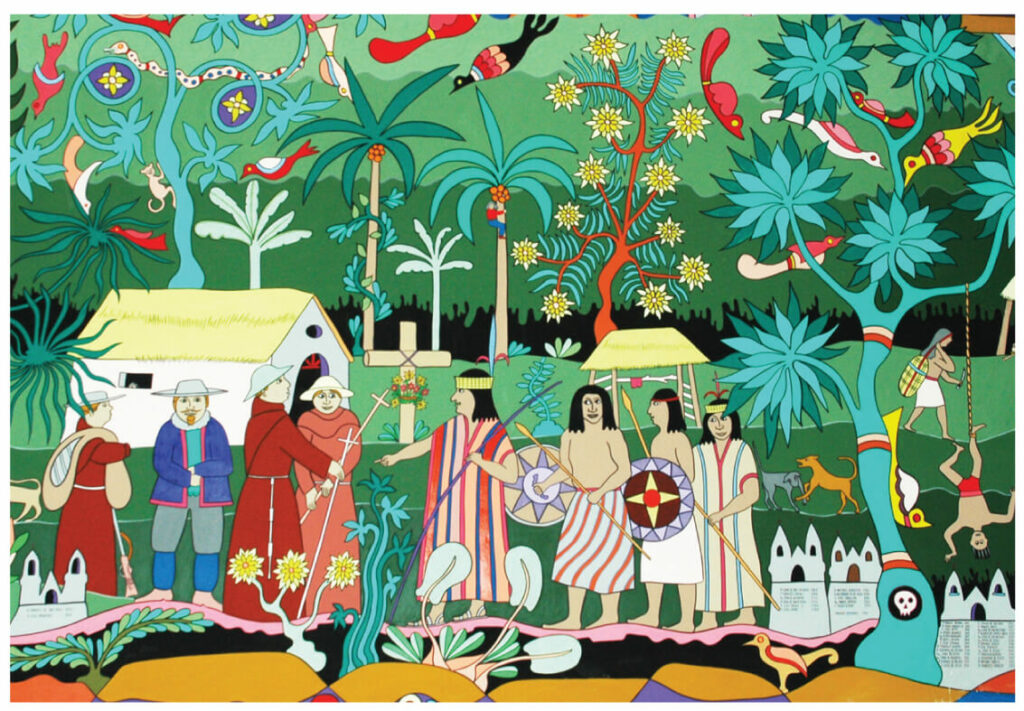by Becky Chabot

Jesus’ baptism marks the beginning of his ministry and pictures him filled with the Holy Spirit and as beloved of God. Jesus lives in loving communion with Father and Spirit.
Our Catholic faith sees our world and our lives as full of grace—God gifts us with life and light. God gifts us with freedom and the capacity to love one another and love God in return, to go beyond our individual selves and form families and communities—new communions of love.
As Jesus begins his ministry, his first action is calling disciples to follow him. He gathers together companions who will share and continue his mission. In the gospel this Sunday Simeon anticipates Jesus’ mission to the whole world.
The word mission means sent; it contains a to and a for meaning. A person receives a mission to something and for something. Jesus sends his disciples to all peoples for the purpose of announcing the good news of his resurrection from the dead and making them disciples. Jesuit and Franciscan priests were sent to the people of Latin America for the purpose of spreading the gospel and drawing people into Christian community—the Church.
Mission is about the dynamic of going out and drawing in. The Church reaches out and the Church draws in.
Simeon speaks to Mary after his prayer of praise. He anticipates that Jesus’ mission and destiny as the messiah will cause her pain. “This child is destined for the falling and the rising of many in Israel and to be a sign that is opposed.”
Dr. Martin Luther King, Jr., lived Jesus’ mission. He went out to those who didn’t believe African Americans deserved equality and civil rights for the purpose of winning their hearts and forming in our nation a more perfect union.
When he called the Second Vatican Council, Pope John XXIII invited all Catholics to renew our commitment to Jesus’ mission. Before the Council, Catholics worked toward a better life in heaven. The Council called Catholics to make life better for the poor and afflicted on Earth.
In the document called The Church in the Modern World, the bishops of the Second Vatican Council challenged us to bless the poor as Jesus teaches in the beatitudes. The document begins:
“The joys and hopes, the griefs and anxieties of the people of this age, especially those who are poor and afflicted, these too are the joys and hopes, the griefs and anxieties of the followers of Christ.”
In baptism all Christians commit to live Jesus’ mission. All of us are responsible for the mission of the Church, not only priests and bishops.
We can live Jesus’ mission by reaching out to serve in a soup kitchen and raise money to build a school. We also live the beatitudes in our everyday lives when we put ourselves in the shoes of classmates and family members and listen to one another’s stories.
We live Jesus’ teachings in school when we reach out and draw in those others dismiss as unimportant, low in status. Theatre of the Oppressed builds skill in creative ways to work against oppression and violence we experience.
Jesus’ mission rips us out of our comfort zones and drags us into our world to live Jesus’ values. In his world everybody matters.
Instructing, advising, consoling, comforting are spiritual works of mercy, as are forgiving and bearing wrongs patiently. The corporal works of mercy consist especially in feeding the hungry, sheltering the homeless, clothing the naked, visiting the sick and imprisoned, and burying the dead.
Catechism of the Catholic Church #2447
